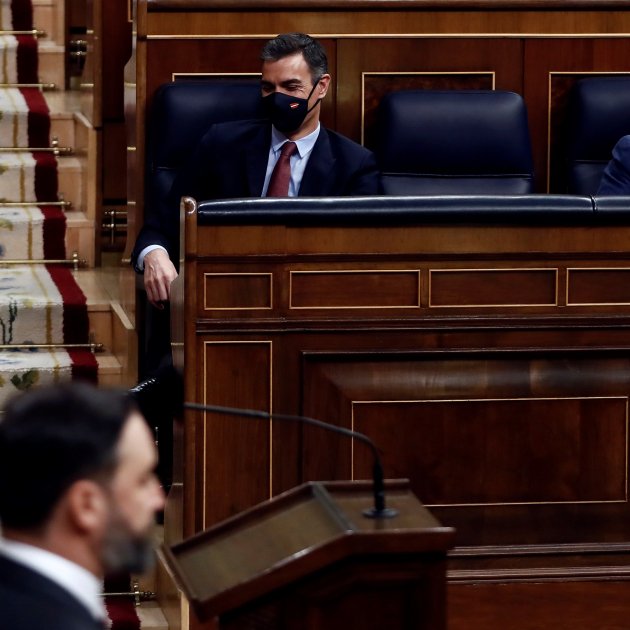For the fifth time in 40 years, Spain's Congress has voted on a motion of no confidence in the government, and this has been the least successful vote of all five. The motion targeting the Pedro Sánchez executive only received 52 votes in favour, that is, all of the deputies of the far-right Vox party, the third largest in the Spanish parliament, which proposed the motion. The other 298 MPs voted against. Even rebellious Popular Party (PP) deputy Cayetana Álvarez de Toledo refrained from crossing party lines and fell in behind her leader Pablo Casado.
On Wednesday, thanks to the strategy, Vox received hours and hours of media prominence, and took the opportunity to set out its entire political agenda and its extremist discourse, in both Spanish and international terms. Party members spoke of the "illegitimate Popular Front government" (a 1930s reference), referred to the Catalan pro-independence MPs "renegade deputies" who had to be outlawed, and labelled the current PSOE-Podemos coalition as the "worst government in 80 years" - including the Franco dictatorship. But in the style of European neo-fascism, Vox MPs also spoke of a "Soviet" European Union, of the "Chinese Communist virus" and even had time to invoke the philanthropist George Soros.
The position of the PP, which, as the main rival of Vox on the right, was the main target of the no confidence motion, was very difficult. After many doubts, Pablo Casado thumped the table, with a loud "this far and no further" assertion. In his umpteenth turn towards the centre, the leader of the main opposition party asserted his role as such, and differentiated his "centred" party from the "anti-liberal populism" of Vox leader Santiago Abascal. "We are not like you because we don't want to be like you," Casado told Abascal, moving away from the far right and criticising them across the board. The Vox leader replied that the position of the PP was unfortunate and reminded Casado that he governs in Andalusia, Murcia and the Community of Madrid thanks to support from the extremist party. But for now, the right-wing rupture is simply rhetorical.
Meanwhile, the Spanish government watched almost from the sidelines and at times even with popcorn. Pedro Sánchez used the first day to portray Vox as a ridiculous, post-Francoist party. Today, the second day of the debate, saw him throwing a lifeline to Casado, seeing the advantage of splitting him away from the extremist postulates of his fellow travellers. The PM offered to freeze his plan to reform the General Council for the Judiciary - a proposal which has come under criticism from the European Commission - in exchange for a PP return to a softer positioning that would unblock the renewal of the judicial bodies through a bipartisan deal.
Deputy PM Pablo Iglesias spoke in response to Pablo Casado, possibly abandoning the speech he had prepared. While applauding the PP's clarification of where it stands, the Podemos leader also said that the shift toward the centre by both the PP and Inés Arrimadas's Ciudadanos was useless: "It's too late." All this provided a little cohesion for most of the Sánchez government's original investiture support, in the face of the threat from the far right.
Pro-independence parties: "Sánchez is passive"
The three Catalan pro-independence parties - JxCat, ERC and the CUP - have always been clear that they would vote against the motion. However, all three used the no-confidence debate to send warnings to the Sánchez-Iglesias government, which feels very comfortable when it takes on the far right. ERC spokesperson Gabriel Rufián warned the Spanish PM that "the extreme right has been living off your fears and complexes for 40 years" and that the PSOE could not stay passive. On behalf of JxCat, Laura Borràs urged the coalition executive to "give fewer lessons and look in the mirror more often." From the CUP, Albert Botran sent a general warning: Vox is "a symptom of the crisis of the Spanish state and of capitalism."
Vox's partial victories
Numerically, there was no way Vox could ever win the motion. But the extremists were seeking several partial victories through this manoeuvre. First of all, to hurt Pablo Casado by making tangible something that was already almost a fact: that Santiago Abascal has snatched the reins of the opposition from him. Secondly, for Vox to again project the broad lines of its ultra-conservative agenda in a public and media showcase. In passing, the far-right party was able to promote its candidate for the Catalan elections, Ignacio Garriga, who defended the no-confidence motion in front of Congress on Wednesday. Least important of all were the party's actual arguments: simple padding.
